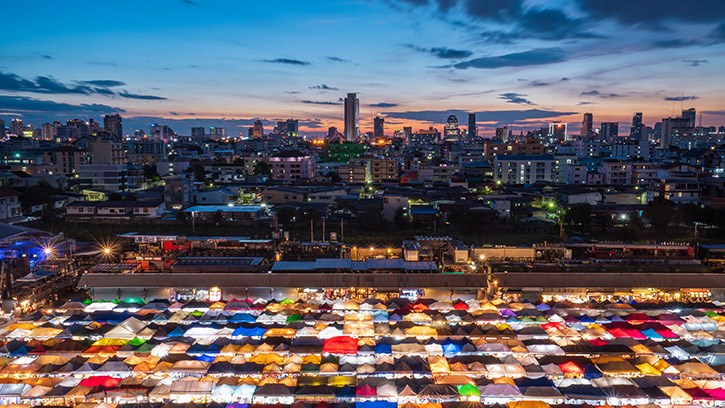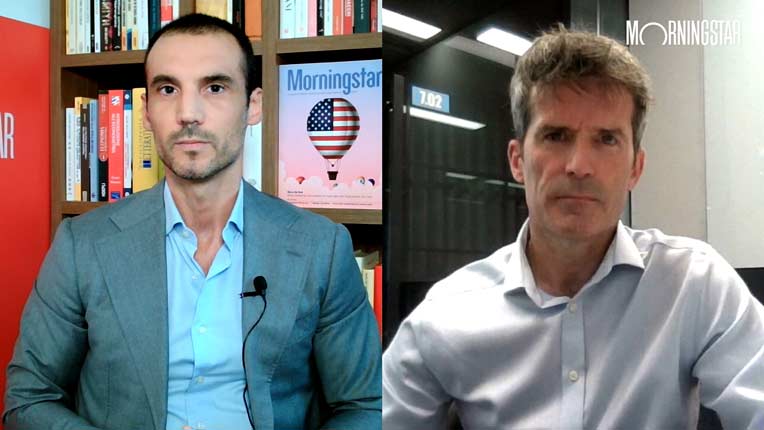Christopher Johnson: Welcome to Morningstar. Today, I'm joined by Ngo Thanh Thao, Co-Portfolio Manager of the Vietnam Enterprise Investment Trust (VEIL). Let's dive in. Over one year, your investment trust achieved a 0.9% return rate underperforming its peer benchmark. What do you put this down to?
Ngo Thanh Thao: We have a quite positive return in the first two months of 2024 with the NAV increase by more than 3%. However, our one-year return is still impacted by some lags in last year's 2023. As you may consider, 2023 was a tough year not only for Vietnam but also in terms of global economy. So, with the Fed rising rate, the geopolitics tension, and also the weakening in domestic demand has also impacted the business performance of the companies in Vietnam. Therefore, some sectors like, especially the retail sectors, have seen a very tough condition last year due to the slowdown in the consumption demand. Our two key holdings in this sector are Mobile World and PNJ has faced a slowdown last year and the share price was underperforming the benchmark. This mainly explains the 0.9% underperformance of the fund.
However, we do believe that the earnings of these two companies and also the retail sector will rebound in 2024, firstly, due to the low base effect for last year and secondly, it's also driven by the growth in the consumption and also the increase in the public investment in Vietnam. Currently now, the interest rate in Vietnam is low, even, lower than the pre-COVID level. So, with the low interest rate in the environment and also with the strong determination of the Vietnam government to deliver the economic growth this year, we think the retail sector will recover.
CJ: You mentioned Mobile World and it makes up 4.67% of the trust. So why are you still backing the retail chain? You mentioned that it hasn't done as well. So why are you still bullish on this stock?
NTT: Mobile World is our top pick in the retail sector. It is the best-in-class management and also leading in the retail transformation in Vietnam. So, after suffering a difficult year in 2023, as I already explained, the company expects to come back strongly this year. Profit will jump hugely and of course it will continue to recover in 2025 and also see a huge jump. The robust business performance is thanks to, firstly, its electronic consumption and also mobile phone distribution has already bottomed out and started to recover during the year. The recovery momentum also repeats on the grocery business, which is the new business of Mobile World. The grocery business of Mobile World now has become number one in the modern trade player. And secondly, the grocery chain of Mobile World has achieved the breakeven level and started to have profit this year. We expect Mobile World to able to scale up its grocery business, meanwhile still manage to improve profitability. And recently, the pre-IPO of the grocery business has been completed with the valuation of US1.5 billion, which already unlocked a substantial value for our shareholders.
CJ: Banking is a very large sector of the investment trust at 38.72%. So why is that?
NTT: VPBank is our top holding. And recently, for your update, we haven't reduced any share in this bank because we still believe that VPBank will have a good outlook this year. So, in general, for our banking sector, it is the largest sector in the bank portfolio, which reflects our belief that the banking sector will benefit most from the economic recovery. The banks and technology are the two sectors that have seen the most aggressive growth in the past 10 years. Banks make up 40% weight in the Vietnam stock market and contributes more than 60% of the earnings on the Vietnam stock market. Therefore, for this year, 2024, we anticipate an improvement in the credit growth, also in the net interest margin, and also an improvement in the asset quality. This year, we think the earnings in the banking sector will increase from 18% to 20% and also, the return on equity stays resilient at 18%. Moreover, the bank valuation is now at a very cheap valuation, especially in the private bank, only 1 to 1.2 times price to book. So, we think the bank may deserve a re-rate in terms of the valuation this year.
CJ: I wanted to get your perspective on how Vietnam may have benefited from trade tensions between the US and China. But have there also been challenges that those tensions have brought?
NTT: The tension between the US and China caused the supply chain shift out of China, and Vietnam has benefited from that. Vietnam offers businesses an ultimate location for manufacturing, which is in line with China Plus One strategy that many companies now pursue due to the rising costs in China. The foreign direct investment flow into Vietnam was strong in recent years. This year, Vietnam received around US$20 billion coming to the country. And we think this trend will maintain solid in the coming years. Thanks to the strong FDI investment, Vietnam has been moving from being a low-tech manufacturer to high-tech manufacturing. The investment from big companies like Intel, Samsung, Apple, LG show that there is a big potential in the country. And it is safe to say that Vietnam, although it cannot absorb all the China manufacturing, the country is well-positioned to take more production and along with other countries in the region to play an important role in the global value chains.
CJ: Coffee prices are soaring at the moment and the main reason is because Vietnam has been hit by drought. I want to get your perspective on how important agriculture is to Vietnam's economy and also how do you see climate change impacting this sector as food demand will continue to increase?
NTT: Agriculture is an important industry in Vietnam with the contribution to GDP of around 11% to 12%. Although the agriculture listed companies in the Vietnam stock market are very small, only 0.5% of the Vietnam index, the climate change has a big impact to the agriculture in Vietnam. For example, the saltwater intrusion, the rising sea level and saltwater intrusion into the coastal area can contaminate fresh water source and the agriculture land, especially in the Mekong Delta River. And also, the drought also increased in both frequency and coverage. We also see the increase in the extreme weather events like the flood, typhoon, and that could impact the agriculture productivity.
As a result, there was a light reduction of the agricultural land area in Vietnam from 2019 until now. The reduction in the agriculture land is around 1.5%. And also, there is also a drop in the total rice production in the two largest paddy fields in Vietnam, which is the Red River Delta and the Mekong Delta in the south. However, Vietnam's government has been proactive in preparing the action plan policy and resolution to aim at mitigating and adapting to the climate change, with particular emphasis to the two largest deltas in Vietnam. For example, in the Mekong Delta, a sustainable development has been applied from 2017, which focuses on the climate change adaption and the facility enhancing the regional connectivity and also to increase the production of the rice field. So, thanks to the implementation of the climate change mitigation, the rice productivity in the Mekong Delta and also the Red River Delta has increased by 4% from 2021 until now.
CJ: Finally, I wanted to get your perspective on real estate. So, it's the second largest holding at 19.71% – or second largest sector, rather. Why is that? And how is Vinhomes allowing you to get exposure to the real estate sector in Vietnam?
NTT: Despite a slowdown in the real estate sector in the last two years, including the recent debt crisis, the Vietnam real estate sector remains an important sector in the Vietnam economy. An important factor that impacts the real estate sector is the mortgage rate, where we recently observed that has been dropped significantly and even below the pre-COVID level. So, the mortgage rate in Vietnam now is around 6% to 7%, so even cheaper than the US market. With this reduction in the mortgage rate, we think it could help the financial affordability for homebuyers and addressing the real demand for the sector. So as the interest rate is going down, we see the transaction volume also experiencing a slight uptick from the second half of last year and continue in 2024. Both in the big city, Lai Ho Chi Minh City and Hanoi, the number of transactions already increased by 50%.
So, looking ahead towards the year-end, we think the real estate market will see an improvement and therefore we are prepositioned in the real estate sector for the theme of recovery. And as you mentioned, Vinhomes is one of our big investments in the real estate sector. Vinhomes is the biggest real estate developer in Vietnam and is also one of the best developers with a unique model of providing the ecosystem in residential real estate. Last year, despite the difficulties in the real estate market, Vinhomes still could deliver the net earnings of US$1.3 billion, thanks to its strong capability, its execution, and development and launch project. This year, we predict that Vinhomes could still deliver the same level of profit as last year and this is also our top nine holdings with 3.4% in the portfolio. And together with all the selected names, like Khang Dien House, is also our key representative for the sector.
CJ: Ngo, thank you so much for taking the time out to speak to me.
NTT: Thank you.
CJ: This is Christopher Johnson from Morningstar UK.






























